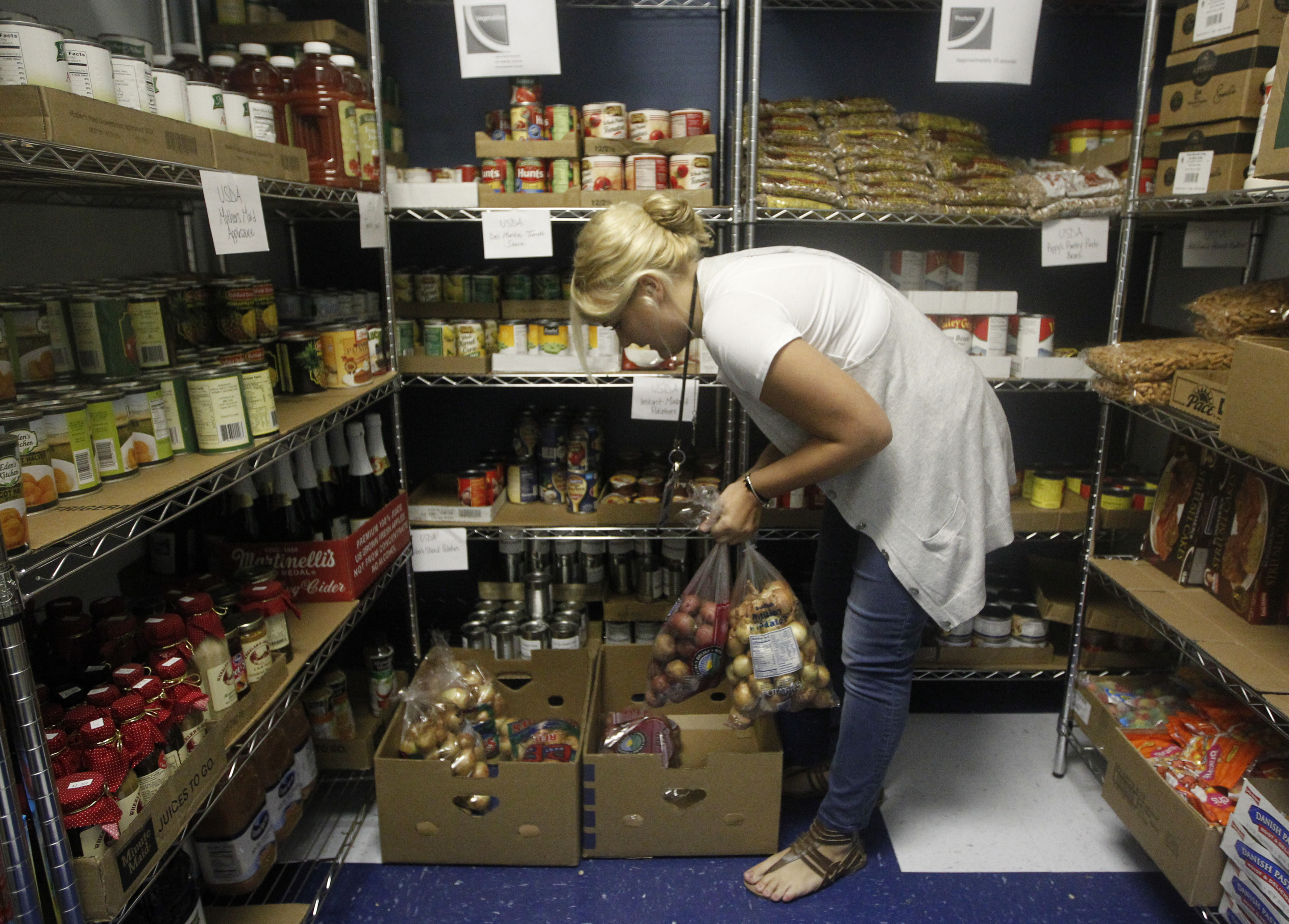 Geriatrics case manager Kristin Meador takes bags of potatoes and onions out of the pantry to be packed for delivery Friday at Partnership Elder Services in Eastgate Town Center. The program provides monthly food deliveries that meet the USDA's "My Plate" dietary guidelines to elderly clients at risk of not getting enough to eat.
Geriatrics case manager Kristin Meador takes bags of potatoes and onions out of the pantry to be packed for delivery Friday at Partnership Elder Services in Eastgate Town Center. The program provides monthly food deliveries that meet the USDA's "My Plate" dietary guidelines to elderly clients at risk of not getting enough to eat.FOOD FOR THOUGHTThe states with the highest percentage of seniors facing the threat of hunger:1. Arkansas, 24.23 percent2. Mississippi, 20.49 percent3. Alabama, 20.34 percent4. Nevada, 18.8 percent5. Tennessee, 18.79 percentSource: National Foundation to End Senior Hunger. State rankings were compiled from data in the State of Senior Hunger 2011, an annual report by Dr. James P. Ziliak and Dr. Craig Gunderson.
Meigs County seniors attend diabetes cooking classes at the local senior center, but some of them don't have the money to purchase the fresh fruits and veggies used in the recipes.
This year the Chattanooga Area Food Bank came to the rescue for several of them.
For the first time the local food bank is piloting a program supported by a grant from AARP that allows seniors to select diet-specific food in proportions recommended by the U.S. Department of Agriculture.
"You would not believe the variety. We had okra, peppers, squash, cucumbers, tomatoes, apples, grapes and cherries," said Susie Hairrell, program coordinator at the Meigs County Senior Center.
"This is a godsend to our community," she said.
The program is especially good for seniors on restrictive diets, such as those for high blood pressure or diabetes, or those who don't eat meat.
With this program the client gets a menu or goes to a mobile unit and selects the food for their food box, compared to having the box prepacked as is usually done at the food bank, said Christina St. Germaine, case manager for the Partnership for Families, Children and Adults and coordinator for Hamilton County seniors.
The recipient is only restricted in that his selections must meet standards set by the USDA. For example, the USDA says the customer gets 10 pounds of grains, but the senior gets to select what grains he eats. And it may require that the person gets 25 pounds of veggies, but the senior selects which veggies or which proteins, said St. Germaine.
The Chattanooga Area Food Bank is among 10 agencies that shared a $400,000 AARP grant at $40,000 apiece. The money is intended to help seniors eat better.
It's used to supply food to 100 low-income seniors age 62 and older in Meigs County and 50 in Hamilton County once a month.
But that's just the tip of the iceberg when it comes to fulfilling a need, said Holly Ashley, the Chattanooga Area Food Bank spokeswoman who applied for the grant.
Metropolitan Ministries recommended an additional 100 seniors in Hamilton County for the program, but there was no funding, said Ashley.
The National Foundation to End Senior Hunger ranked Tennessee the fifth-worst state in the country for senior hunger, with 18.79 percent of its seniors facing the threat of hunger. About 4.8 million Americans over age 60 are food insecure, according to the U.S. Census Bureau.
Local food bank officials say they are looking for funding to not only sustain the program but increase its outreach. Without additional funding, the year-long program ends in April.
Several seniors say there is a need.
"You know how often I eat," asked 61-year-old Jeremiah Frazier, who is homeless and said he asks restaurants for any food they plan to throw away. "Oftentimes it's once every two days."
He admits to drinking alcohol more than he should, but said he would eat more if he had different food selections.
He said he doesn't go to the doctor regularly and has never been diagnosed with anything. But he's concerned about having diabetes.
"My ankles stay numb," he said. "And I'm numb on the bottom of my feet."
Sixty-seven-year-old Anthony Wayne is lactose intolerant, on medication for high blood pressure and has Crohn's disease.
He said he doesn't eat much because of his Crohn's disease but it would be helpful to have more food selections.
He eats most meals at the Chattanooga Community Kitchen -- oatmeal for breakfast and the kitchen prepares a sandwich for him for lunch. But he said he would appreciate being able to select his own foods.
The number of seniors dealing with hunger more than doubled from 2001 to 2009 and that doesn't include seniors hurt by the recession, U.S. Sen. Bernie Sanders of Vermont said when addressing Congress about senior funding.
More seniors are having the problem because more people are aging, said Lura Barber, senior policy analyst for the National Council on Aging. They also may be likely to battle sicknesses, further depleting their economic ability as they get older. About 14 percent of seniors 65 and older in Tennessee, approximately 117,600 people, live in poverty, according to the U.S. Census Bureau.
Contact staff writer Yolanda Putman at yputman@timesfreepress.com or 423-757-6431.

